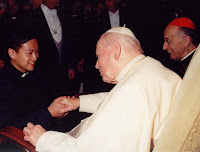 Nei nostri tempi abonda la letteratura sugli angeli—nei libri che si trovano nelle librerie dove ci sono grosse sezioni su questa materia, e anche sull’internet. Purtroppo tanta di questa materia che gira non viene dall’insegnamento della fede cristiana ma dal New Age. Comunque, tutto il mondo tocca questa realtà degli angeli.
Nei nostri tempi abonda la letteratura sugli angeli—nei libri che si trovano nelle librerie dove ci sono grosse sezioni su questa materia, e anche sull’internet. Purtroppo tanta di questa materia che gira non viene dall’insegnamento della fede cristiana ma dal New Age. Comunque, tutto il mondo tocca questa realtà degli angeli. Qual’è il significato della nostra festa oggi? Oggi non guardiamo qualche santo che ha superato sua debolezza per essere un vero discepolo di Cristo. Vediamo tre angeli—arcangeli—che non hanno avuto né debolezza né peccato: molto diversi da noi; molto lontano dalla nostra capacità, possiamo dire.
Allora, come ci troviamo con questa celebrazione? Ci insegna alcune cose. Prima, che esistono questi angeli come messageri di Dio, come i suoi strumenti portando la sua parola—sappiamo che la parola angelos vuol dire “messaggero”. Seconda, che questi tre arcangeli, specificamente, fanno una grande parte della storia di salvezza—Michele, come prottetore del popolo eletto, Gabriele che ha portato l’annuncio di Dio, Raffaele che ha portato guarigione al padre di Tobia.
Anche i nomi sono pieni di senso: Michele—“colui come Dio”, Gabriele—“forza di Dio”, Raffaele “Dio ha curato”. Sempre attaccati al nome di Dio. Le loro missioni dependono in Dio; senza di lui non possono stare solo. È impossibile per noi di essere angeli, ma siamo sempre con Dio e dunque, è sempre possibile dare tutti i nostri affari alla disposizione della sua missione. Quindi, nel nostro lavoro, nella nostra presenza si vedrà Dio che salva, che cura, che parla. Perché come gli arcangeli siamo chiamati di essere messaggeri di Dio.
--a homily of mine which I delivered at Comunità Don Bosco, the Salesian community in Rome where I belonged (2002-2004). I made it for the feast of the Archangels, September 29, 2003 when I presided over our Eucharistic celebration. I have not yet made a traslation of this; i'll supply one soon.




